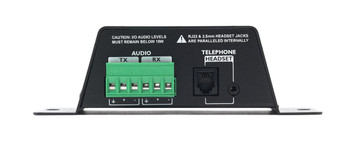Description
The Soundweb London BLU-102 offers a fixed configuration of 10 analog inputs and 8 analog outputs, an analog telephone interface, configurable signal processing, AEC processing, and a high bandwidth, fault tolerant digital audio bus.
The RJ-11 port enables the BLU-102 to interface with a standard POTS (aka PSTN or Analog PBX) telephone network.
The BLU-102 has open architecture which is fully configurable through HiQnet™ London Architect. A rich palette of processing and logic objects and a “drag and drop” method of configuration provide a simple and familiar design environment.
The BLU-102 contains dedicated AEC processing for up to 8 independent AEC algorithms. The AEC algorithm can be applied to signals coming from the local analog inputs or from the digital audio bus. 8 individual AEC references (one per algorithm) allow the user to provide a solution for multiple conferencing spaces using a single device.
Automatic Gain Control (AGC) and Noise Cancellation (NC) are also provided per AEC algorithm. AGC ensures that microphone levels remain at an optimum level, and NC removes steady state noise (such as from a projector fan or air conditioning device) from the signal path.
This processor features a low latency, fault tolerant digital audio bus of 48 channels which uses standard Category 5e cabling giving a distance of 100m between compatible devices. Fiber media converters can be used to increase the distance between devices to over 40km.
The BLU-102 is compatible with the entire Soundweb London family and its 48 channel digital audio bus represents channels 1-48 of the larger 256 channel digital audio bus when integrated with the BLU-800, BLU-320, BLU-160, BLU-120, BLU-BIB and BLU-BOB devices.
Analog Inputs provide software configurable gain in 6dB steps up to +48dB per channel and software selectable Phantom Power per channel.
Phantom Power, Signal Present and Clip information per channel is easily accessible, without the requirement for a PC, from clear front panel LED indication. A bi-directional locate function allows devices to be identified both from and within HiQnet London Architect.
12 Control Inputs and 6 Logic Outputs allow the BLU-102 to be integrated with GPIO compatible devices. The Soundweb London Interface Kit, comprehensive documentation which details how Soundweb London systems can be integrated with third party control systems, is included within the installation of HiQnet London Architect.
The BLU-102 and the other members of the Soundweb London family provide the building blocks of the perfectly tailored system solution.
Features
- 10 Analog Inputs (with 48v Phantom Power per Channel)
- 8 Analog Outputs
- RJ-11 Telephone Input/Output Port
- Configurable Signal Processing
- 8 Channels of AEC Processing with Auto Gain Control and Noise Cancellation
- Rich Palette of Processing and Logic Objects
- 48 Channel, Low Latency, Fault Tolerant Digital Audio Bus
- Clear Front Panel LED Indication
- Bi-Directional Locate Functionality
- 12 Control Inputs and 6 Logic Outputs for GPIO Integration
- Soundweb London Interface Kit for Third Party Control System Integration (Documentation)
- HiQnet Device
- Configuration, Control and Monitoring from HiQnet London Architect
Specifications
Chassis: 19" (single rack space)
Custom I/O (card based): no
Analog Inputs: 10
Digital Inputs: 0
AEC Inputs: 8
Analog Outputs: 8
Digital Outputs: 0
Telephone Connection: 1
Max Inputs/Outputs: fixed
Config: Software
LCD Display: no
Logic Processing: yes
RS-232: yes
GPIO: yes
Signal Processing (MHz): 400
Cobranet: no
SWL Digital Audio Bus: 48
AVB: no
Dante: no
Front Panel Led Indicators:
Per Input: Signal Present, CLIP, 48V (Input only)
Other: COM, STAT, ERR, PWR
Analog Inputs: 10 electronically balanced on Phoenix Combicon removable screw connectors
Mic/Line Inputs: Nominal gain 0dB, electronically switchable up to +48dB,in +6dB steps
Input Impedance: 3.0kΩ
Maximum Input Level: +20dBu with 0dB input gain,+8dBu with 12dB gain
CMRR: >75dB at 1KHz
Input Noise (E.I.N.): <-125dBu typical with 150Ω source
Phantom Power: 48V nominal, selectable per input
A/D Latency: 37/Fs [0.77ms@48k]
Analog Outputs: 8 electronically balanced on Phoenix/Combicon removable screw connectors
Maximum Output Level: +19dBu
Frequency Response: 20Hz-20KHz (+0.5dB/-1dB)
THD: <0.01% 20Hz to 20KHz, +10dBu output
Dynamic Range: 108dB typical, 22Hz-22KHz unweighted
Crosstalk: <-75dB
Output Impedance: 40Ω balanced and 20Ω unbalanced
D/A Latency: 29/Fs [0.60ms@48k]
Telephone Interface:
AC-REN: 0.0B
Dynamic Range: 67dB
Frequency Response: 300 to 3.3kHz
THD: <0.3%
Transhybrid Loss: >48dB with LEC enabled
LEC Tail Time: 64ms
TX Level: -10dBm RMS average
RX Level: +3.2dBm RMS
AEC Processing: 8 independent algorithms
AEC Processing Latency (Original 8k Algorithm): 2385/Fs [49.69ms@48k]
AEC Processing Latency (Full Bandwidth Algorithm): 1609/Fs [33.52ms@48k]
Tail Length: 200 ms
Average Convergence Rate: 49 dB/s (Net convergence over multiple FFT bands)
Control Ports: 12 inputs and 6 outputs
Control Input Voltage: 0 to 4.5v
Control Input Impedance: 4.7kΩ to +5V (2-wire mode), >1MΩ (3-wire mode)
Logic Output Voltage: 0 or +5V unloaded
Logic Output Impedance: 440Ω
Logic Output Current: 10mA source, 60mA sink
Watchdog Output: Phoenix/Combicon connector for failsafe control
Opto Output Current: 14mA maximum
Withstanding Voltage: 80V maximum (Off)
Series Impedance: 220Ω (isolated)
Control Network:
Connectors: RJ45 Ethernet connector
Maximum Cable Length: 100m/300ft on Category 5 cable between device and Ethernet switch
BLU link:
Connectors: 2 x RJ45 Ethernet connectors
Maximum Cable Length: 100m/300ft on Category 5e cable between devices
Max. Number of Nodes: 60
Latency: 11/Fs [0.23ms@48k]
Pass Through Latency: 4/Fs [0.08ms@48k]
Power and Dimensions:
Mains Voltage: 100-240V AC, 50/60Hz
Power Consumption: <55VA
BTU Rating: <188 BTU/hr
Operating Temp. Range: 15 (59) to 35 (95) degrees C (degrees F)
Dims: (H(U) x W x D): 1.75” (45mm)(1U) x 19” (483mm) x 12.5” (318mm)
Weight: 9.1 lbs / 4.1 kg











